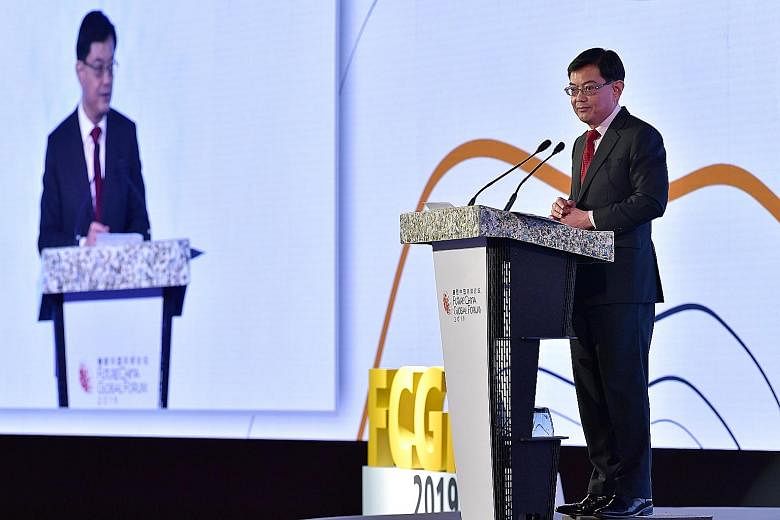Taking action to mitigate climate change and ensuring economic growth are two key challenges that, if not managed well, could unravel the progress the world has made in the past few decades, said Deputy Prime Minister Heng Swee Keat.
In a keynote address at the annual FutureChina Global Forum yesterday at Marina Bay Sands, Mr Heng outlined three ways that countries can tackle the two challenges: By forming and deepening international collaborations, enabling all segments of society to work together and developing next-generation leaders to further sustainability.
"Cooperation among countries and cities will help us to strengthen connectivity and achieve longer-term environmental, economic and infrastructural sustainability," he said at the event organised by Business China Singapore to help enterprises understand issues concerning China. This year's theme involves sustainable development.
He flagged China's efforts, such as the Belt and Road Initiative (BRI) International Green Development Coalition, which allows governments, enterprises, research institutes and the civil society to shape a green Belt and Road.
The BRI is China's mega plan to build ports, railways, roads and trading hubs linking it to Europe, Africa and parts of Asia.
Another example is the development of the Guangdong-Hong Kong-Macau Greater Bay Area (GBA), which boosts connectivity, trade and investment flows between nine Pearl River Delta cities, as well as Hong Kong and Macau.
Besides aiming to be a global innovation hub, the GBA looks towards adopting an innovative, green and low carbon development model, Mr Heng said, adding that China will place greater priority on conservation and environmental protection.
The GBA presents new opportunities for enterprises, such as in infrastructure. "Infrastructure projects are long term and highly capital intensive," he said.
"We have to plan and structure these projects properly to ensure resource efficiency, economic viability and social impact over their long lifetime," he said at the event, now into its 10th year.
Countries must also collaborate, he said, citing the Paris Agreement, which commits them to take concrete action against climate change.
A second way to combat sustainability challenges is to enable all segments of societies - governments, businesses and individuals - to work together effectively.
Mr Heng cited how Singapore has introduced measures to catalyse the private sector to pursue new growth opportunities, such as by setting aside $900 million under the Research, Innovation and Enterprise 2020 urban solutions and sustainability plan.
He added that the pervasive use of technology can help countries go green, and the carbon tax implemented here this year sends a "price signal to incentivise the reduction of carbon emissions".
He noted that there will also be increasing demand for sustainable products and services, arising in particular from a growing consciousness among the younger generation.
Finally, countries and businesses have to invest in developing next-generation leaders who are committed to building a more sustainable future, said Mr Heng. Noting that it is important to balance between short-and longer-term needs, he said "building the leadership pipeline is core to this endeavour".
Former United Nations secretary-general Ban Ki-moon, in his opening speech, noted the importance of taking action against climate change.
"If we, as a global community, effectively address the issues related to climate change, we would also address the majority of sustainable development goals," said Mr Ban, who is now president and chair of the Global Green Growth Institute.
Mr Fu Hua, director-general of publicity in the Communist Party of China's Guangdong Committee, noted the uneven development across regions in China, adding that narrowing this gap is an urgent task.
He said that openness is key to sustainable development and that Guangdong province has sought deeper cooperation with countries.
SEE HOME


